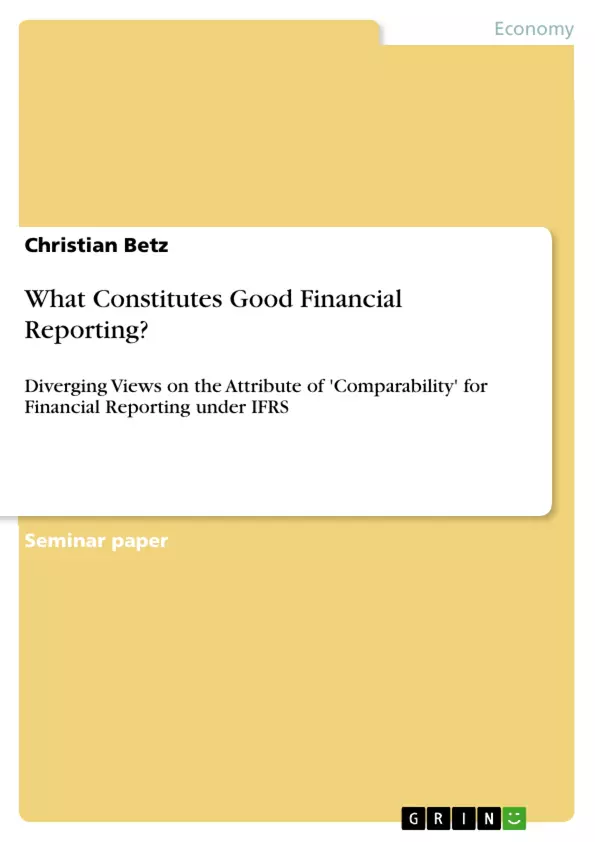Diverging views on the attribute of „comparability. for financial reporting under IFRS
Six guest lectures at Stockholm School of Economics passed by and one word left a permanent mark on my mind. With a high regularity and consensus the representatives of different interest groups involved in financial reporting mentioned „comparability., sometimes referred to as „consistency. or „continuity., as one particularly important attribute of good financial reporting.
Heurlin (2011, p. 8/12), as an IASB member, stressed the need to acknowledge consistency in financial reporting, which he regards as a proxy for good financial reporting. Scheja (2011), in his auditor role, stated that PwC has a major focus in auditing on ensuring comparability of financial reporting, i.e. by preventing the usage of non-GAAP measures for earnings management. According to him, the attribute of relevance is mainly ensured by preparers. Also, Gerentz (2011) mentioned the term comparability twice; first, stating that NCC aims at preventing managerial opportunism in IR, and second, stressing the need for NCC to create peer comparability by educating analysts about their own “more correct IFRS interpretation”. Last, Malmqvist (2011), representing analysts, pointed out the importance that firms enable peer comparability, i.e. by providing comparable income statements without company-specific non-GAAP measures, where irregularities are explained in footnotes, and by using more comparable accounting methods.
So, on this point: All united? As opposed to the otherwise often diverging opinions, all interest groups1 strikingly seem to be aligned that comparability constitutes good financial reporting. But do the involved interest groups really share one joint perception about the attribute „comparability. for financial reporting? In particular, is the IASB.s idea of comparability defined in the framework widely accepted in practice? Considering the different interests of involved groups, one might doubt that those groups really share a common understanding, opinion and rationale with regards to 'comparability'.
This paper reflects upon the two questions by taking three explicit perspectives: (1) IASB, (2) preparers, and (3) analysts / investors.
Inhaltsverzeichnis (Table of Contents)
- From the IASB's viewpoint
- From an preparers' viewpoint
Zielsetzung und Themenschwerpunkte (Objectives and Key Themes)
This paper examines the attribute of 'comparability' in financial reporting, particularly under IFRS, and investigates whether there is a shared understanding of this attribute among different interest groups involved.
- The IASB's perspective on comparability as an enhancing qualitative characteristic within the IFRS framework.
- The challenges and tensions preparers face in achieving comparability, particularly in light of the diversity of IFRS methods and the pressure to provide both historical and cross-firm comparisons.
- The impact of non-GAAP measures on comparability and the potential for earnings management.
- The role of capital markets in rewarding or punishing firms based on the level of comparability in their financial reports.
- The differing views on comparability between the IASB, preparers, and investors, highlighting the potential for conflicting interests and interpretations.
Zusammenfassung der Kapitel (Chapter Summaries)
- From the IASB's viewpoint: This section explores the IASB's definition of comparability within the IFRS framework, emphasizing its importance for facilitating global capital market efficiency. The discussion delves into the potential tension between achieving comparability and allowing for more relevant depiction of different economic phenomena, highlighting the IASB's focus on providing investors with more relevant information rather than simply aiming for uniform accounting methods.
- From an preparers' viewpoint: This section examines the challenges faced by preparers in ensuring comparability of financial reports. It addresses the inherent tension between achieving comparability over time and across firms, particularly in light of IFRS changes and the increasing prevalence of non-GAAP measures. The role of self-interest and market pressures in influencing preparers' approach to comparability is also explored, analyzing the potential for earnings management and the conflicting signals sent by market mechanisms.
Schlüsselwörter (Keywords)
This paper focuses on the concept of comparability in financial reporting under IFRS, exploring the perspectives of the IASB, preparers, and investors. Key topics include IFRS framework, enhancing qualitative characteristics, global capital market efficiency, non-GAAP measures, earnings management, and the role of market mechanisms in rewarding or punishing firms based on their level of comparability.
Frequently Asked Questions
What is "comparability" in financial reporting?
Comparability is a qualitative characteristic of financial reporting that enables users to identify and understand similarities and differences among items across different firms and time periods.
Does the IASB prioritize comparability over relevance?
The IASB views comparability as an "enhancing" characteristic, meaning it is important, but the information must first be relevant and faithfully represented to be useful.
Why do preparers use non-GAAP measures?
Preparers often use non-GAAP measures to provide what they consider a "more correct" interpretation of their business performance, though this can hinder comparability with peers.
How do analysts view company-specific accounting methods?
Analysts generally prefer comparable accounting methods across industries to facilitate peer analysis and reduce the risk of managerial opportunism.
What is the tension between consistency and comparability?
Consistency refers to using the same methods for the same items over time, which is a means to achieve the goal of comparability, but the two are not identical.
- Citation du texte
- Christian Betz (Auteur), 2011, What Constitutes Good Financial Reporting?, Munich, GRIN Verlag, https://www.grin.com/document/178162



